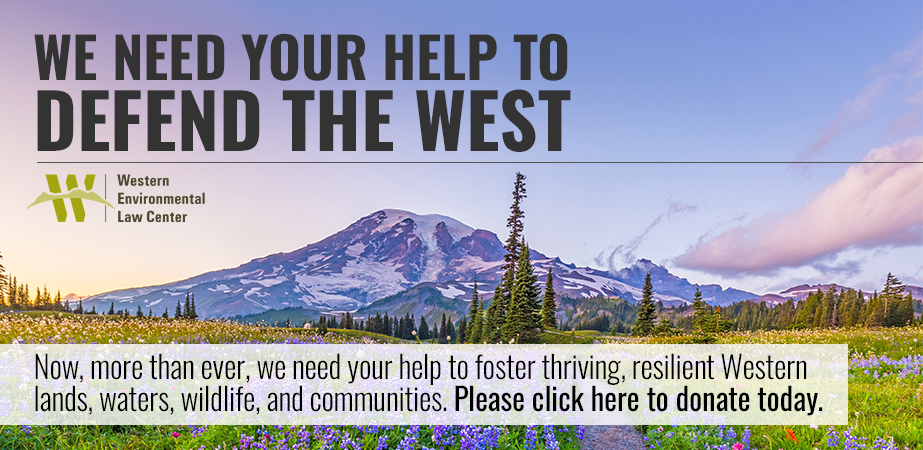The Fiscal Responsibility Act—or debt ceiling bill—announced over Memorial Day weekend contains numerous pieces from the failed “Dirty Deal” that would create a decades-long legacy of pollution and further brutalize frontline communities. The Western Environmental Law Center urges Congress to reject the debt ceiling deal’s poison pills and pass a clean debt ceiling bill.
“To appease Sen. Manchin, the ‘Dirty Debt Deal’ is centered on legislative approval of the Mountain Valley Pipeline—a fossil fuel project that would emit the equivalent climate pollution of 23 coal-fired power plants and deny people and communities along the pipeline’s path with basic legal protections, procedural fairness, and environmental justice,” said Western Environmental Law Center Executive Director Erik Schlenker-Goodrich. “The Dirty Debt Deal also meddles with the National Environmental Policy Act, undermining decision-making in the public interest, while also failing to provide real, tangible investments in improved decision-making regarding renewable energy transmission. Democrats should demand a clean debt ceiling bill and vote no on this absurdity.”
Other elements of the deal present serious risks to the country’s future and a just transition. Namely, the deal would freeze all non-military spending, which will prolong environmental review and limit agencies’ ability to ensure public safety.
The Dirty Debt Deal would also attack frontline communities’ needed social benefits. New work requirements for the Supplemental Nutrition Assistance Program (SNAP) would increase food insecurity for millions of Americans. Cuts to the Temporary Assistance to Needy Families (TANF) program would make it more difficult for families to achieve self-sufficiency. Harsh spending restrictions over the next two years will take money out of the pockets of struggling Americans who rely on a wide range of social programs: the Special Supplemental Nutrition Program for Women, Infants, and Children (WIC) program, the Emergency Food Assistance Program (TEFAP), Supplemental Commodity Food Assistance Program (CSFP), Head Start, Low-Income Home Energy Assistance Program (LIHEAP), and other programs to help people overcome poverty.
In addition, the Dirty Debt Deal would roll back student loan forgiveness. Student loan forgiveness has the potential to be a life-changing policy for millions of people that would make large progress toward narrowing the racial wealth gap.
Finally, the Dirty Debt Deal would immediately claw back $1.38 billion of Internal Revenue Service funding and repurpose one-quarter of the $80 billion in Inflation Reduction Act that would impede the IRS’ ability to improve enforcement against wealthy tax cheats. This would greatly undermine the Inflation Reduction Act’s ambitious federal climate action.
“The Dirty Debt Deal harms the western U.S., full stop,” said Schlenker-Goodrich. “We need to stand together,oppose the Dirty Debt Deal, pass a clean debt ceiling bill, and prevent right-wing politicians in Washington, D.C. from holding the country’s financial strength hostage. We’re sick and tired of political games designed to benefit politicians and polluters, not people and communities. We desperately need leaders who will work with us to justly transition the U.S. away from its dependence on fossil fuels and towards a thriving, resilient, and renewable energy future.”
NATIONAL ENVIRONMENTAL POLICY ACT (NEPA) PERMITTING BACKGROUND:
There are opportunities to strengthen our country’s permitting processes. But the reason for delays is not the implementation of bedrock laws such as the National Environmental Policy Act, as “permitting reform” advocates suggest. We must tend to our garden of environmental laws to further long-sighted momentum as we transition to renewable energy, not let fossil fuel polluters wreck the garden in service of profit over people.
The vast majority of federal actions subject to NEPA review are evaluated through an expedited analysis. Less than 1% of federal actions require a more time-consuming environmental impact statement. In terms of legal challenges, less than 1% of NEPA actions result in litigation, even as litigation plays a critical role in holding federal agencies and polluters accountable, protecting clean air and water, and creating opportunities for community-led solutions. Importantly, studies have shown that expediting NEPA review and limiting public involvement lead to inadequate, environmentally harmful decisions and a higher likelihood of litigation.
Contact:
Erik Schlenker-Goodrich, 575-770-1295, gro.w1751745425alnre1751745425tsew@1751745425gskir1751745425e1751745425

